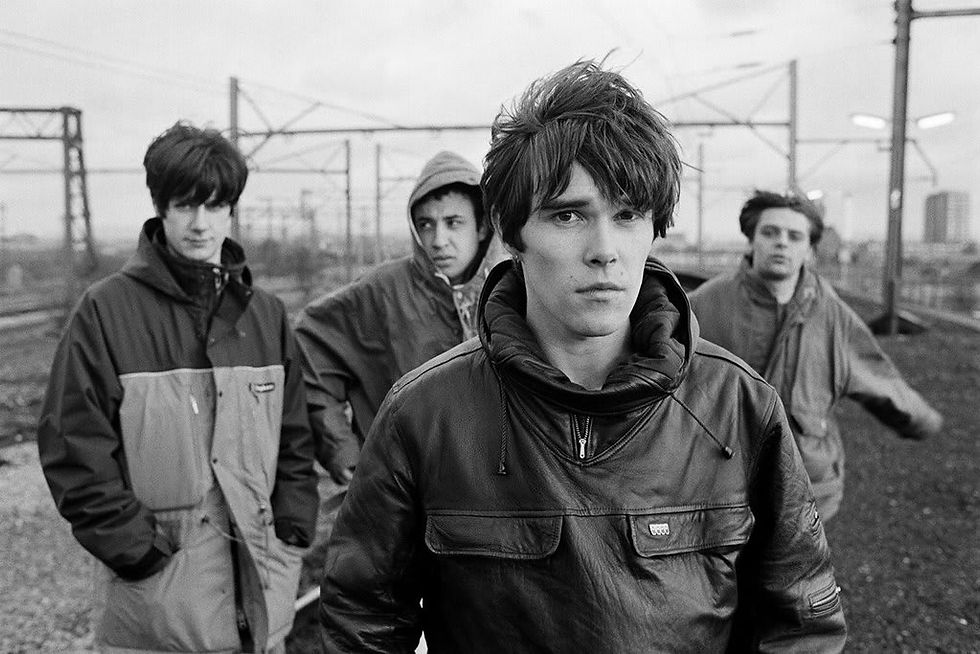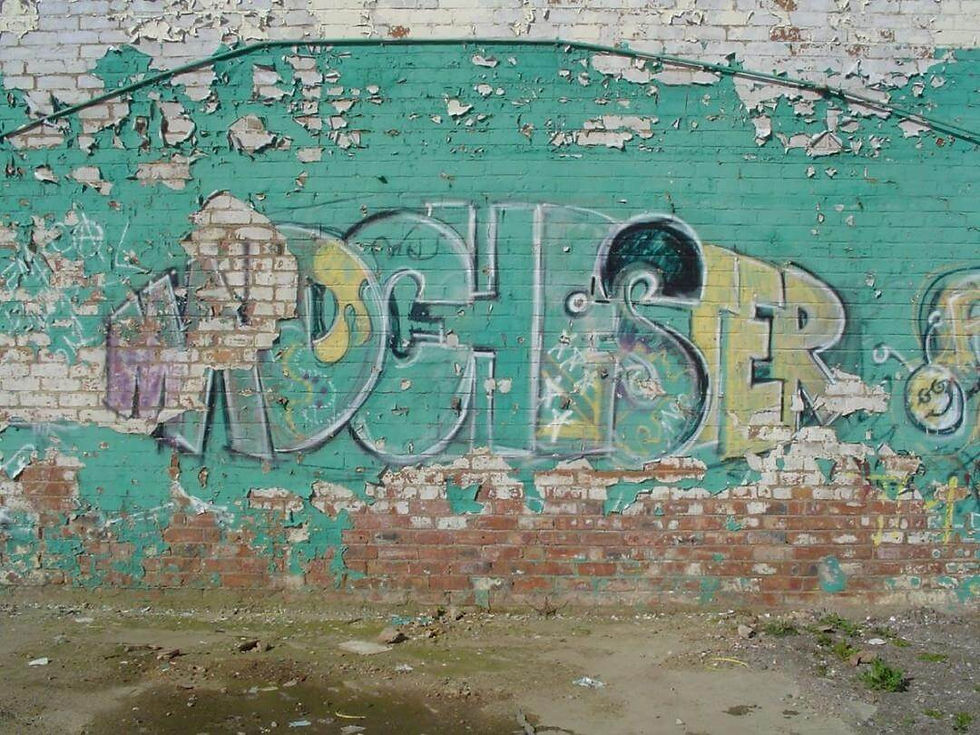Britpop: The Rhythm of the Isles
- PK White
- Dec 28, 2023
- 8 min read

Pictured - Oasis 1996 (Photograph: Stefan Rosseau/PA
In the late ‘80s, the British city of Manchester experienced a colorful wave of cultural prominence seen no better than in its expressive music scene known as Madchester. Bands like The Happy Mondays, The Charlatans, and most notably The Stone Roses dominated the localized Manchester scene before spreading throughout the remainder of the British Isles. The psychedelic-infused indie rock style, filled with extensive dance breaks and solo sections, took indie rock in a direction it had never been before, and the Brits loved it. It eventually seeped into the American underground, with Stone Roses songs like Fools Gold or I Wanna Be Adored popping up on American college radio intermittently. The colorful scenes of Madchester, sadly, were not to stay for too long, as the genre was on its way out shortly after its creative peak. With the Madchester giants facing internal struggles and newer artists taking different creative paths, by 1992 the Brits had their eyes on a newer, fresher, more airwave-friendly style of music, the sonic giant of Britpop.
1991 saw the debut album of Blur entitled Leisure, bridging the gap between Madchester, Shoegaze, and Britpop. Citing a sea of ‘70s and ‘80s art rock and alternative rock influences like Depeche Mode, The B-52’s, David Bowie, The Jam, and of course, The Stone Roses, Blur’s debut album timed perfectly with the decline of Madchester and the birth of Britpop, dipping its toes into each pool. Stone Roses tracks like Made of Stone and She Bangs the Drums set the stage for Britpop to come, reigniting the flickering ‘60s pop glow back into rock music with their enchanting choruses. Matching the vocal brilliance of Stone Roses frontman Ian Brown, was the guitar work of John Squire. Squire's style was a unique take on rock, more Mark Knopfler (Dire Straits) than Johnny Marr (The Smiths), although it was indie to its core. Just listen to the debut Stone Roses record, they wholeheartedly set the stage for what was to come, and oh, how they did it so eloquently.

(Pictured - The Stone Roses)

(Madchester Street Artwork outside The Hacienda in Manchester)
Formed in 1988 during the Madchester period while studying at Goldsmith College in London, Blur's initial sound was much more in line with Madchester and equally the post-punk revival of the late ‘80s. The band found a good amount of success with their release of Leisure, but as Blur fans will tell you, there was a lot more to come. Alongside Oasis, Suede, and Pulp, these bands have since become known as the “Big Four” of Britpop. Blur continued their chart success throughout the ‘90s, releasing Modern Life is Rubbish in 1993, and their masterpiece Parklife in 1994. By 1994, Blur could arguably be called the biggest band in Britain, with Radiohead frankly not being anything special yet by most accounts, and Oasis having released only one smashingly successful album to Blur’s two, or two and a half, depending on who you ask. As adored as Blur was in the UK in 1994, their reach throughout the rest of Western Europe was quite moderate, and their hype was absent in the US. To take it even further, their reach really never made it to the US, aside from college and underground radio. Blur’s success has been closely tied to the guitar prowess of Graham Coxon paired with Damon Albarn’s uniquely recognizable voice. Coxon’s guitar soars to the heavens in songs like This Is a Low, Chemical World, and of course, their one song which most Americans do know, Song 2, which of course, was not really a Britpop track at all. Song 2 as great as it was, was more grunge than anything.
Also released in 1993 was Suede’s self-titled debut album. This group of rockers borrowed a tad more from the glam rock sounds of the late ‘80s than their Britpop brethren. Suede formed four years before the release of their debut album, as they remained unsigned for quite some time. By 1992, the band had begun receiving some press and praise, particularly from NME, whose writer John Mulvey wrote, “They had charm, aggression, and... if not exactly eroticism, then something a little bit dangerous and exciting.” The band offered a contrast to the dying Madchester scene, as well as a contrast to the American grunge scene, appealing to subtly nationalistic Brits looking for the “next big thing” in British music. Suede’s appeal only extended beyond the British Isles in a limited capacity, but their early releases have gone down as some of the finest records of all time according to publications like Rolling Stone, Melody Maker, Pitchfork, and NME.

(Pictured - Blur)

Pictured - Suede in Thailand (1997)
Dueling with Blur for the title of the most dominant Britpop act of the '90s was Manchester’s Oasis. Made up of outspoken frontman Liam Gallagher and his brother Noel on lead guitar, alongside guitarist Paul “Bonehead” Arthurs, bassist Paul “Guigsy” McGuigan, and drummer Tony McCarroll. Formed in 1991 out of the remnants of Madchester, the band found massive success with their esteemed debut album Definitely Maybe. Housing iconic '90s anthems like Supersonic and Live Forever, the record was a worldwide success, even going platinum in the US, where Britpop had not yet made much of an impact. The record took a heavier approach to its musicality, almost to a noticeable grunge-ish extent. Heavy and almost sludgy-sounding guitar on perhaps the record's finest track, Supersonic, is far from the jangly, bright guitar heard in early '90s alternative rock. The rock outfit behind Liam’s voice hinted towards the Seattle alternative sounds in a way most British rockers of the day did not delve into, although the vocal work points in a more pop-friendly direction.
More hardline alternative rock fans tend to call the Oasis debut their masterpiece, but as far as the media and the charts were concerned, the band's next record, (What's The Story) Morning Glory, was about as good as music could possibly be in 1995, becoming one of the best-selling albums in the UK of all time. Songs like Wonderwall, Champagne Supernova, and Don’t Look Back in Anger have gone down among the best Britpop anthems of all time, with Wonderwall being the unequivocal first. The second studio album by Oasis found a massive amount of success in the US, cracking the American top five and being most Americans' first exposure to the beauty of Britpop. Back in the UK, the Official Charts Company (OCC) declared the record the official best album of the ‘90s. By this point, Britpop was nearing its peak, as it was all the rave in Britain, with Blur and Oasis continuing to battle it out on the charts. The sound dominated British popular music in a distinct way that Mod-Revival or Madchester never even came close to doing. Britpop was hot in the mainstream, yet equally adored in the underground.
Back on the other side of the pond, Americans adored Oasis’s rock-forward, anthemic approach to songwriting, donning classic rock influence while still sounding uniquely modern and fresh. As adored as Oasis was in the US by 1995, with Wonderwall cracking the top 10 alongside a bunch of the bands other tracks peaking towards the top of airplay and alternative charts, the love they received in the US was nothing like the larger-than-life adoration the group received back in their homeland. In the UK, their impact extended well beyond their music, influencing a generation of Brits from their fashion choices to their demeanor. Liam and Noel became British fashion icons with fans matching their casual, often scruffy look, wearing parkas, bucket hats, and sunglasses. Their brash demeanor and often hostile attitudes were also picked up by some fans, resulting in a prideful, authentic, and defiant Oasis following class of Brits. The band’s story as a whole, coming from humble, working-class beginnings to international stardom, was a beautiful success story, influencing countless young Brits.

Pictured - Oasis at Knebworth, 125000 People (1996)
Oasis continued to top charts in the UK for the next ten years or so until their deeply publicized 2009 breakup. Oasis topped the British charts with all seven of their releases, putting them in an exclusive club of British artists alongside Coldplay, Adele, and a few others. By 1997, Britpop seemed to be reaching the end of its road, with Blur's fifth record distancing itself from the sound, delving more into the rock centric, lo-fi sounds of Pavement or Built to Spill. Graham Coxon of Blur claimed by this point he was going through a “mid-pop-life crisis”, and wanted Blur to write music “that scared people again.” British media attention began to shift away from Britpop towards bubblegum pop groups, and dance-friendly, non-rock acts like The Spice Girls, Hanson, and The Backstreet Boys. The portion of British media attention still focused on rock, especially the more sophisticated side of rock, was now entrenched in the hype that followed Radiohead's 1997 groundbreaking record OK Computer.
A mixture of band fatigue, declining nationalism, and oversaturation of Britpop groups led to the genre's eventual demise. To make matters worse, Oasis's third studio album Be Here Now was met with immediate praise, but followed quickly by intense scrutiny, polarizing the band for the first time. The record has been met with even worse attitudes in the time since, although Liam ranked it his favorite record. In speaking about his brother Noel in 2002, “If he didn't like the record that much, he shouldn't have put the fucking record out in the first place... I don't know what's up with him, but it's a top record, man, and I'm proud of it—it's just a little bit long.” Certain publications have praised the record retrospectively, while others have criticized it, but what stands as a testament now is that it did indeed fall short of expectations (albeit near impossible expectations), did little to enhance their discography long-term, and is just not celebrated and listened to very much anymore.
Just as Mod and Madchester had run their courses, by 1997, Britpop was just about finished, yet with a legacy tough one to put into words. The sense of national pride bestowed upon Brits was noteworthy, as once again, the British had shown the unique knack they have for creating music. 25 years later, Oasis remains amongst the most renowned British acts of the modern era, and Blur, Suede, and Pulp each hold unique spots in British musical history. Wonderwall, Common People, and Parklife are some of the most nostalgic songs of the '90s, with Wonderwall especially extending far beyond Britain's aquatic barriers.
The legacy of Britpop lived on well into the 21st century with groups like Coldplay embracing the post-britpop sound, achieving worldwide recognition and praise for decades to come. The "post-britpop" groups still embraced the guitar as the central musical focus, still taking notes from The Beatles, and The Rolling Stones although noticeably less lyrically focused on British life. Scotland saw a surge in musical creativity following the decline of britpop with groups like Travis, Snow Patrol and Belle & Sebastian finding their footing as the britpop hype died out and made room for more diverse styles of rock to again dominate the airwaves.
Britpop flickered bright from the British Isles through the mid-90s as yet another phase of vibrant and brilliant musicianship originating from a place which has given the world more than its fair-share of rock music. As an American writer, the sheer amount of world renowned artists that came from a place so small is a complete anomaly. Perhaps the grey skies mixed with the honest and often no-nonsense British approach to life was indeed the secret musical formula.
For a deeper look into Madchester, be sure to check out Madchester: The Beat That Rocked Britain












